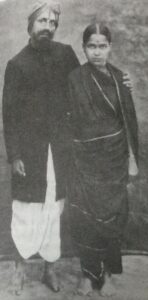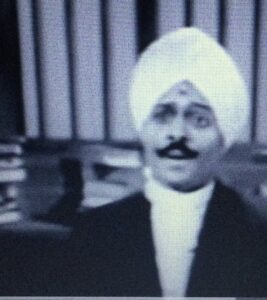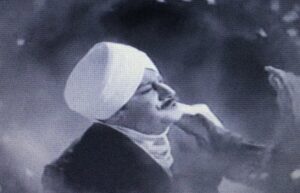Personal Thoughts
by Sachi Sri Kantha, December 10, 2021

Poet Bharati with his wife Sellamma
One hundred years have passed since Indian freedom fighter and the gifted Tamil poet of the 20th century, Subramania Bharathi (1882-1921) lost his life prematurely at the age of 39, on the early hour of September 12th. Quite many of the hagiographical accounts remembering his life, including the entry in the English Wikipedia hide an unpleasant fact that he was partially addicted to opium (Cannabis). Was opium a Muse to him? Why he surrendered to opium? Did he take opium as a medication for physical/mental pain to allieviate poverty? An interesting study on this issue was published by psychiatrician Dr. Ottilingam Somasundaram, in 2012. For those interested, I provide a pdf file of his paper, published in the Indian Journal of Psychiatry of April-June 2012. Poet Bharathi, touched with fire, Ind J Psychiatry, 2012, 54(2), 188-191. On December 6th, I received a mail from one of his junior collaborators Dr. Vijaya Raghavan, that Dr. Somasundaram “…is doing good and active, still engaging in research and writing about Tamil literature and psychiatry. He is 96 now.” To the best of my knowledge, Dr. Somasundaram’s paper is the ONLY ONE available in English about the health profile of poet Bharati.
My initiation to Bharati’s poems began when I was 10 years old (Nov. 8, 1963 to be exact), after I received a book of his verses as a class prize for Tamil language, at the Colombo Hindu College, Ratmalana. If memory serves, the biopic on Tamil Nadu freedom fighter V.O. Chidamparam Pillai (1872-1936), with Sivaji Ganesan starring in the title role, Kappalotiya Thamizhan (1961; The Tamil who launched a Ship) was also released in Colombo, sometime before that. In those pre-video cassette, pre-DVD days, simultaneous release of movies in many countries was unheard of. For multiple reasons (political motive of the film, theater availability, bureaucratic restrictions on the number of Tamil films imported to the island, box office ticket sales in Chennai, personal preferences of owners of theater chains in Ceylon etc.) Tamils in Ceylon had to wait for more than a year for a movie that was released in Chennai, to be released in the theaters of Ceylon.
Though this movie’s theme related to Indian independence struggle, it is my belief that due to the pro-Tamil sentiments in the dialogs and the songs that were featured, its release in the theaters of Ceylon was delayed inappropriately. The reason: fart-catching movie censors of the then Sirimavo Bandaranaike government minded the local developments of the satyagraha campaign of the Federal Party since 1961. Nevertheless, it got released eventually.

S.V. Suppiah as Bharati in ‘Kappalotiya Thamizhan’ (1961) movie

Sivaji Ganesan as Bharati, in ‘Kai Kodutha Theivam’ (1964)
In the ‘Kappalotiya Thamizhan’ movie, esteemed character actor S.V. Suppiah portrayed Bharati with appreciated merit. Since 1947, beginning from A.V. Meiyappan Chettiar (the founder of AVM Studios, 1907-1979), quite many Tamil movie producers had made use of Bharati’s songs and popularized them among illiterate Tamil folks. Three years ago, A.R. Venkatachalapathy published an interesting book captioned, ‘Who Owns That Song? – The Battle for Subramania Bharati’s Copyright. In it, he had described the efforts taken by movie mogul Meiyappan Chettiar to buy the rights of Bharati’s songs from a Gujarati merchant Jeshinglal Mehta for 9,500 Indian rupees. In this book, Venkatachalapathy portrays the role played by Meiyappan Chettiar as a wily, business-minded manipulator, who eventually lost his gains. According to one count by P.V. Gopalakrishnan in 2017, nearly 40 Bharati songs have been featured in Tamil movies.
I provide below the Youtube links to 21 of my favorite Bharati songs which I heard in ‘Radio Ceylon’ of that time, until 1981. I have split these 21 songs into 5 categories, namely (1) Independence propaganda songs, (2) Children/adolescent songs, (3) songs appreciating labor, (4) songs of societal criticism, and (5) Courtship songs (solo/duet).
Independence propaganda songs
Viduthalai viduthalai viduthalai – Naam Iruvar (1947) – singer T.R. Mahalingam
https://www.youtube.com/watch?v=K-w6JouUPYQ
Aduvome pallu paduvome – Naam Iruvar (1947) – singer D.K. Pattammal.
https://www.youtube.com/watch?v=cdAxFP3S5KY
Senthamil nadenum pothinile – Raja Rajan (1957) – singer P. Leela (?) chorus
https://www.dailymotion.com/video/xrogu0
Enru thaniyum intha sutanthira thaham – Kappalotiya Thamizhan (1961) – singer Tiruchi Loganathan.
https://www.youtube.com/watch?v=fnxofXrGWjo
Thaneer viddo valarthom – Kappalotiya Thamizhan (1961) – singer Tiruchi Loganathan
https://www.youtube.com/watch?v=eE3uLEj-xYI
Velli Panimalaiyin meethulavuvom, Kappalotiya Thamizhan (1961), singers Tiruchi Loganathan, Sirkazhi Govindarajan, L.R. Eswari
https://www.youtube.com/watch?v=N33KJLMwK4Y
Parukkule Nalla Naadu – Kappalotiya Thamizhan (1961), singer Sirkazhi Govindarajan.
https://www.youtube.com/watch?v=M8PNhspIFHs
Sinthu nathiyin misai nilavinile, Kai Kodutha Theivam (1964), singer T. M. Soundararajan.
https://www.youtube.com/watch?v=AKLzxSGhVyw
Children/Adolescent songs
Theeratha vilaiyaadu Pillai, Vethala Ulagam (1948), singer D.K. Pattammal.
https://www.youtube.com/watch?v=GrFQwZwKjBc
Odi vilaiyaadu Paapa, Kappalotiya Thamizhan (1961), singers Sirkazhi Govindarajan, K. Jamuna Rani
https://www.youtube.com/watch?v=WYb30LU5aq4
Oli padatha kanninai va va va, Rangoon Radha (1956), singer T.S. Bhagavathi
https://www.youtube.com/watch?v=1w2NSzIIDxU
Songs appreciating Labor
Kooli miha ketpar, Nalla Thangai (1955), singer G. Ramanathan
https://www.youtube.com/watch?v=d13J5Km0Z8g
Engiruntho vanthan, Padikatha Methai (1960), singer Sirkazhi Govindarajan
https://www.youtube.com/watch?v=-2ZgZKVkOkg
Songs of Societal Criticism
Nenju Porukuthillaiye, Parasakthi (1952), singer C.S. Jayaraman
https://www.youtube.com/watch?v=JgUOyi2TWyo
Nallathor veenai seethe, Kalvanin Kathali (1955) – singer P. Bhamnumathi
https://www.youtube.com/watch?v=nUVlzqMJtr0
Courtship songs (solo/duets)
Vennilavu nee enakku, Naam Iruvar (1947), singer T.R. Mahalingam
https://www.youtube.com/watch?v=FBJqJzXYcPk
Kani nilam vendum, Anthaman Kaithi (1952) singers C.S. Jayaraman and M.L. Vasanthakumari
https://www.youtube.com/watch?v=E_X7I18BeK0
Manathil uruthi vendum, Kalvanin Kathali (1955) – singers T.M. Soundararajan and P. Bhamnumathi
https://www.youtube.com/watch?v=T42cbaE_nCA
Suddum vili chudaro Kannamma, Puthu Vaazhu (1957) – singer M.K. Thyagaraja Bhagavathar.
https://www.youtube.com/watch?v=79ztuibjUTc
Mangiyathor nilavinile, Thirumanam (1958) – singer T.M. Soundararajan.
https://www.youtube.com/watch?v=5EH0fqCwYHs
Mangiyathor nilavinile, Paavai Vilakku (1960) – singer C.S. Jayaraman
https://www.youtube.com/watch?v=6Xs20u7k2d8
Kaatru veliyidai Kannamma – Kappalotiya Thamizhan (1961), singers P.B. Srinivas and P. Susheela
https://www.youtube.com/watch?v=M0ch-llN4iQ
One song, ‘Mangiyathor nilavinile, kanavinithu kandaen’ [In the dimmed moon light, I had a beautiful dream], has two versions – sung by T.M. Soundararajan and C.S. Jayaraman respectively. The actor for both songs was Sivaji Ganesan! Apart from Sivaji Ganesan, other leading actors of the past (Thyagarajah Bhagavathar, T.R. Mahalingam, MGR, Gemini Ganesan, S.V. Ranga Rao, S.V. Suppiah, M.S. Draupathi, P. Bhanumathi, Rajasulochana, Savitri etc.), playback singers and those masters who have arranged music to all these songs had done a splendid job to bring life to Bharati’s inspiration and spirit.
Make no mistake, that I’m not bad-mouthing Bharati’s genius. But, one of his lines in the song, ‘Sinthu nathiyin misai nilavinile’ is rasping on the nerves of Eelam Tamils, like me. In the movie ‘Kai Kodutha Theivam’, Sivaji Ganesan is featured in a dream scene as poet Bharati, and T.M. Soundararajan gives voice. The Youtube link for this song is https://www.youtube.com/watch?v=AKLzxSGhVyw
The rasping line is of course –.‘Singala theevinukor paalam amaipom – Sethuvai meduruthi veethi samaipom’ [Let’s build a bridge to the Sinhalese island – Let’s make a road via Sethu bridge]. Why Bharati identified Ceylon as ‘Sinhala island’? Was he so dumb about the history of Eelam Tamils? Or could it be the case that when he wrote this song ‘Sinthu nathiyin misai nilavinile’, he under the bad influence of opium? One cannot believe that Bharati wouldn’t have heard about the contributions of Eelam Tamils to Tamil language and literature – especially, Arumuka Navalar (1822-1879) and C.W. Thamotharam Pillai (1832-1901), who were active in Chennai as well.
Finally, I concur with Venkatachalapathy’s views that ‘Subramania Bharati has been ill-served by biographers in English’. For his status, he deserves a better deal from serious biographers.
Sources
Gopalakrishnan PV. Mahakavi Bharatiyar’s works in Tamil film music, Aug 7, 2017.
https://tcrcindia.com/2017/08/07/filmy-ripples-mahakavi-bharathiyars-works-in-tamil-film-music/
Somasundaram O. Poet Bharati, touched with fire. Indian Journal of Psychiatry, 2012; 54(2): 188-191.
Venkatachalapathy AR. Who Owns That Song? The Battle for Subramania Bharati’s Copyright, Juggernaut Books, New Delhi, 2018, 192 pp.
Thanks Dr. Sachi for an amazing tribute to one of the greatest poets of Tamil Language who redefined Tamil Poetry and a trendsetter who influenced all the poets who came after him. The way Dr. Sachi describes how he got inspired by Bharathi as a child will resonate with all the Tamil kids who had some inclination towards literature, I not an exception and I got submerged in my childhood memories wherein we recited poems, acted in plays, wrote essays, and above all enjoyed film songs. As Dr. Sachi mentions it always irked me when I think of his usage of the term ‘Singalatheevu’. It is not an isolated instance, in another poem he uses the term ‘Arya Boomi’ for India, so I think he had a belief which is not acceptable to many of us, but as a master poet he definitely deserves better recognition.